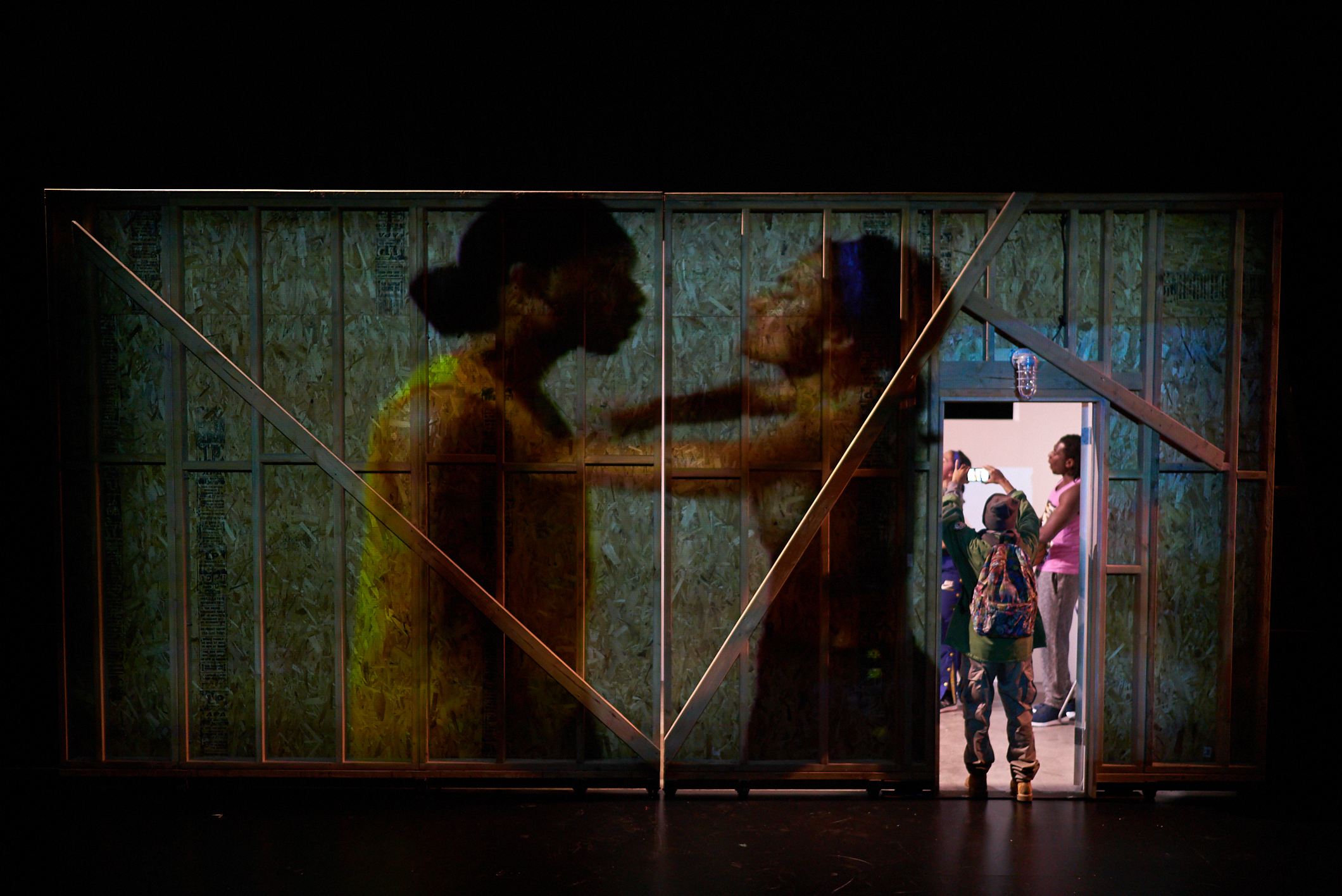REVIEW: “The Revolving Cycles Truly and Steadily Roll’d”
Kara Young (filming), Donnell E. Smith, Toni Ann DeNoble, and James Udom. Photo Credit: Daniel J. Vasquez Productions
Too many black men are missing in America.
Imprisoned, invisible, or else dead—victims of gun violence, healthcare inequity, and, ultimately, insidious societal indifference to their welfare, potential, and pursuit of happiness.
It was a vicious system that brought black men to the colonies of America as slaves, and it is today vicious systems that fail black men in revolving cycles of racism and brutality whose gears churn so incessant and ubiquitously that they easily become the air we breathe, blinding white society to the reality of life for so many of its black and brown fellow citizens.
“The Revolving Cycles Truly and Steadily Roll’d”, a new play by Jonathan Payne that opened in a Brechtian Playwrights Realm production at The Duke on 42nd Street on Wednesday, helps its audience see by way of a fourth-wall shattering, meta-theatrical presentation of scenes—“exhibits”—recounting a missing-person mystery tinged with the poison of racism that is the American inheritance—whether unconsciously unseen or knowingly unwanted.
Karma (Kara Young), a 17-year-old black foster child, roams the streets of “The Oblong”, an inner city neighborhood “isolated by poverty”, as a detective in search of her missing foster brother, Terrell. Like so many poor teenagers of color, Karma is forced to assume a role and provide a function that society fails to deliver. Did Terrell run away? Is he dead? No one seems to care about him or his whereabouts, so Karma makes it her mission to find the truth.
Along the way, she encounters an ensemble of characters, including: Madam Rose Profít (Lynda Gravátt)—“the ‘o’ is an ‘o’ not an ‘ah’ and the ‘t’ is silent. Pro-fee.”—a black merchant who profits from black deaths as owner of “Amigone Funeral Home” (read that name again) but doesn’t recognize Terrell; an old, white public school teacher (Kenneth Tigar) who can’t seem to remember his students’ names but has been posting “missing person” signs for Terrell; Dante (Donnell E. Smith) and his Foster Mom (Deonna Bouye) who don’t know where Terrell went but reveal he witnessed a friend get shot; Terrell’s “Ex” (Deonna Bouye) who thickens the gang plot; street corner personality Gotto (Keith Randolph Smith) who found Terrell in the throes of addiction, before he vanished, leaving his wallet and cell phone behind; a “Friend” (James Udom) of Terrell’s on parole who is sleeping in the backroom of a Chicken Shack restaurant; a white Police Officer (Kenneth Tigar) whose “broken windows” policing keeps the audience on edge; and two gang members named “Death” and “Youth”.
Kenneth Tigar and Kara Young. Photo Credit: Daniel J. Vasquez Productions
I won’t reveal more, but the play makes its imprint in explicitly displaying the tragedy of its titular “revolving cycles” and by viscerally depriving the audience of any disconnection between the world of the stage and the world of our lives. New York City is “The Oblong”, and vice-versa. To wit, Mr. Payne is by day is a social worker for the housing nonprofit Community Access, and the insight and compassion he has gained through this work shows in his writing.
Director Awoye Timpo (“The Homecoming Queen”) keeps the action moving at a crisp pace, and elicits performances of great truth and authenticity. Ms. Young, as Karma, is a particular standout, encapsulating the heartbreaking optimism of a foul-mouthed young girl with untamed intelligence and talent whose life has been a series of roadblocks and disappointments. Karma is quick-witted, mercurial, mischievous, and cool—shields that protect and doom.
Kara Young. Photo Credit: Daniel J. Vasquez Productions
The set, by Kimie Nishikawa, is a white-walled room seen from without, unfinished wall studs laid bare—the wall facing the audience opening and closing to reveal the room within. This structure highlights both the artifice and the unfinished nature of both the play and America—and alternately serves as a classroom, a backroom, a mortuary, and a tomb.
Despite terrific performances throughout, and trenchant treatment of a devastating story and situation, a good portion of the play remained clinical to me—perhaps the product of its social worker-cum-playwright—and its metatheatrical devices are so frequently and bluntly employed that they tend to dull in effect.
What is most powerful is the undergirding fact that yes, too many black men are missing in America, and “at the end of the day”, as Karma implores, Terrell is “a person. A human fuckin' being. And he's gone”.
Bottom Line: “The Revolving Cycles Truly and Steadily Roll’d” makes its imprint in explicitly displaying the tragedy of its titular “revolving cycles” of racism and indifference, and by viscerally depriving the audience of any disconnection between the world of the stage and the world of our lives. With terrific performances throughout, and trenchant treatment of a devastating story and situation, metatheatrical devices cloud its impact, which can be too clinical, but is nevertheless striking.
______________
“The Revolving Cycles Truly and Steadily Roll’d”
Playwrights Realm
The Duke on 42nd Street
229 West 42nd Street
New York, NY 10036
Running Time: 2 hours, 15 minutes (one intermission)
Opening Night: September 19, 2018
Final Performance: October 6, 2018
Tickets





